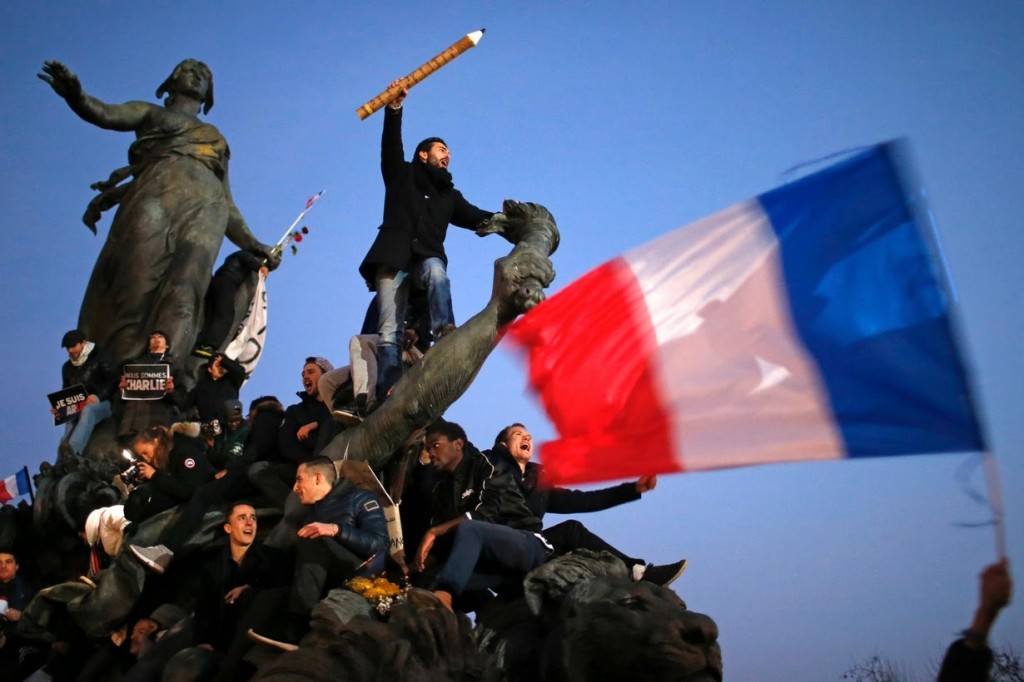
French satirical magazine Charlie Hebdo was attacked on January 7, marking the country’s most brutal terrorist plot since 1961. Two gunmen, brothers Cherif and Said Kouachi, burst into Hebdo’s Paris offices, killing 12 and injuring 11. Among those dead include eight journalists, two police officers, a visitor, and a caretaker.
Two days later, the gunmen were cornered at a printing press 22 miles from Paris, where they were shot dead by French police.
Launched in 1970 after another satirical publication was banned for publishing jokes about former French president Charles de Gaulle’s death, Charlie Hebdo quickly became known for provocative cartoons and crude depictions of high-profile individuals.
After a financially tough start, and a brief shutdown in 1992, the magazine gained popularity in 2006 for reprinting controversial cartoons of the prophet Muhammad. In 2011, Hebdo’s offices were firebombed and destroyed after the magazine again published a picture of Muhammad, this time depicting him as the issue’s “editor in chief.”
“The aim is to laugh,” Laurent Léger, a journalist at Charlie Hebdo, told CNN in 2012. “We want to laugh at the extremists — every extremist. They can be Muslim, Jewish, Catholic. Everyone can be religious, but extremist thoughts and acts we cannot accept.”
In the aftermath of the January attack, which gained Charlie Hebdo widespread media attention, the publication printed 7 million copies of its magazine, up from the usual 60,000. The issue was translated in six languages and distributed across the globe.
Media coverage of the incident has sparked a debate on the issue of freedom of speech, and its limits and constraints.
Some publications decided to print the magazine’s cartoons in their coverage of the attack, while others, like The New York Times, did not.
Delphine Halgand, US Director for Reporters Without Borders, an organization that advocates for journalists, believes that all outlets should print the cartoons.
“We called media to publish Charlie Hebdo cartoons with the idea that terrorists can kill journalists,” Halgand said, “but they cannot kill our freedom of speech. In a sense it was not to try to be provocative, it was to say in the name of the ones who have fallen that we have to continue trying to fight for freedom of information.”
Ms. Halgand also believes that Charlie Hebdo did not cross a line, because “they were attacking and mocking every powerful symbol.”
On the other hand, Dr. Karin Karlekar, Director of the Freedom of the Press project at Freedom House, says she thinks the decision to exclude the cartoons is much more complex.
“I don’t think there is one correct response,” Dr. Karlekar said. “A number of outlets decided that to cover the whole story they needed to show the actual content that Charlie Hebdo was producing. Other outlets chose not to on the grounds that they would not normally publish that type of content.”
Laws about freedom of speech in France are different than those in the United States, where there are very broad protections because of the First Amendment, Dr. Karlekar says. Four laws are employed regularly in France to restrict free speech: criminal defamation, hate speech, Holocaust denial, and glorification of terrorism. Charlie Hebdo regularly faced lawsuits based on a number of these laws.
Fieldston students and faculty were divided on some questions surrounding the attack. Responding to a prompt from The Fieldston News, 38 percent of respondents said they believe the magazine provoked the violent reaction, 62 percent disagreed.
“They have freedom of speech,” Abby Liman (III) said, “but after the attack, they started creating more and more Muhammad magazine covers. In this case, they are provoking anger. They need to remember they are mocking a prophet that many people, especially in France, worship.”
Assistant Head of School Noni Thomas Lopez said that she finds the images offensive.
“Islam generally forbids pictorial depictions of the Prophet Muhammad, and Charlie Hebdo not only went there, but really went there,” Ms. Thomas Lopez said. “I believe any editorial point the paper wanted to make about Muslim extremism could have been made in a different and, frankly, smarter way.”
Others said they stand by freedom of speech, no matter the context.
“There are no waivers on free speech, ever,” James Schapiro (VI) said. “The magazine did not, and could not have, provoked such a response. It speaks to the insecurities of both the Islamic religion, and religion in general that such irrelevant slights could have inspired the fatal massacre.”
Charles Meyer (VI) agreed that freedom of speech should know no bounds, religion included.
“We can’t keep treating religion like some inherent, personal attribute, immune to criticism,” he said. “If we want to preserve our liberal ideals, we must question the institutions that work to destroy them.”
Content published by the magazine led to protests across the world, some in support of its satirical message, others against it. The Fieldston community, too, was split about whether or not Hebdo crossed a line. 38 percent of people replied affirmatively, 31 negatively, and 31 percent were uncertain.
“It is outrageous to claim that Charlie Hebdo crossed a line when it published the caricature of Muhammad,” Josh Kauderer (VI) said. “There is no such thing as crossing a line when free speech is involved.”
Charlotte Blackman (V) disagrees; she believes the cartoons crossed a line by adding to an already existing system of islamophobia in France.
“Ridiculing people of a religion in a country where so many already have a huge prejudice against them is wrong,” Blackman said.
History teacher Harrison Howard remains torn. While he acknowledges the possible utility in using satire to combat totalitarianism, he does not identify with the magazine’s insult to religion.
“Je ne suis pas Charlie Hebdo, mais il faut avoir la liberté de la presse,” Mr. Howard said, which loosely translates to: “I’m not Charlie Hebdo, but you must have freedom of the press.”









